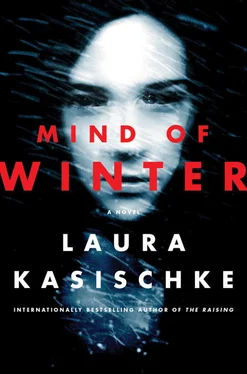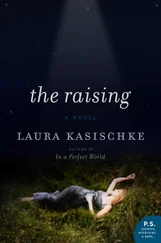Tatiana’s eyes were huge again. They’d never been larger, really. Had they? They were twice their usual size! Was this a symptom of something? Some sort of vitamin deficiency? Was this what the eyes of a person in a manic state looked like? Could Tatty be displaying symptoms of some mental illness she’d not yet presented? Mental illness had been something a few coworkers (not necessarily well-meaning, in Holly’s opinion) had suggested to her when she’d first begun discussing her interest in adopting a child from overseas:
What about the child’s mental hygiene? What about her genes? Wouldn’t a child in a state-run institution be likely to have alcoholic parents? Criminal parents? Schizophrenic parents? If the child were already nearly two years old, who could know what sort of abuse she’d suffered in an orphanage already and what that might mean for her psychological development?
Holly had been made furious by this line of questioning and reasoning, and, after the second or third such suggestion, she’d said, “Well, I guess if my own gene pool were perfect, like yours, I’d be more concerned. But since lethal gene mutations run the length of it, I have more compassion about that than some people might. I mean, unless you’re suggesting that people with bad genes shouldn’t have parents, or that people with bad genes shouldn’t have children…”
Holly had managed, with this shaming tirade, to inspire a couple of abject apologies. And, after that, word must have gotten around the office because no one brought the subject up again.
Still, Holly would not have been human if she had not worried about this herself.
Something, of course, had gone terribly wrong in Tatiana’s lineage. How else did a beautiful healthy black-haired baby girl end up in an orphanage famous all over Russia—all over the world —for its stark interior, its lack of central heating, its meager food rations, its poor staffing (so poor that many of the children who spent their infancies in the Pokrovka institutions could be identified by the permanent bald spots at the back their heads, resulting from having been left on their backs in their cribs without being picked up or held for so long)?
No one in Siberia had ever been able (or willing?) to tell Holly and Eric one word about Tatiana’s biological parents—except that Tatiana had been born “in the East,” which might have been meant to imply that Tatty was of Romany or Mongolian descent, in other words “gypsy” or “Asian.” Of course, this didn’t matter to Eric and Holly. The only thing that concerned them at that point—after that first glimpse of Tatty/Sally’s enormous dark eyes, after they’d fallen utterly in love with her—was whether or not there was anything they should know about her genetics in order to help her, not reject her.
But you couldn’t blame the director or the staff of the Pokrovka Orphanage #2 for not trusting that. They’d seen hundreds of American couples pass through their doors, profess love for a child, find out that the child’s birth mother was a drug addict, or a prostitute, or the victim of incest, or in some way genetically inferior to themselves, then leave the orphanage in search of another child to fall helplessly in love with. Surely it was concern for the children that kept the orphanage staff from divulging too much information.
Not until the very last hour of their last trip to Siberia—with the adoption finalized and Tatty standing stalwartly beside them (she would not be picked up), wearing a little white dress and coat that Holly had brought with her from the States (along with those little white leather shoes), with the first leg of their journey home (train to St. Petersburg) about to begin—would anyone even listen to questions about Tatiana’s origins, let alone answer them:
“Do you believe her mother gave her up, or that she died?” Holly asked Anya, the nurse who clearly loved Tatiana the most, and who, coincidentally, spoke the best English.
Anya cast her blue eyes quickly up to the ceiling, and said, “To this world, the mother is dead.”
This utterance revealed nothing, of course. Dead to this world did not necessarily mean dead. Clearly all of the children in the Pokrovka Orphanage #2 had been born into poverty, or into substance abuse that led to poverty, or they were the products of illicit relationships, or had been born to very young mothers, mothers who were themselves children.
These parents were dead to the world, whether or not they were dead.
There were also some orphans (a large roomful of them, in fact, which Holly had surreptitiously discovered for herself) who were so ill or disabled that even a functional family might have given them up. Those children were kept behind the door that visitors had been forbidden to open—a door that Holly had opened and stepped behind (how could she not?) when the scant members of the staff were occupied elsewhere.
THERE HAD BEEN a sign on the door to that room, printed up professionally in Russian and then translated in sloppy but emphatic English in red pen below—THIS STAFF ONLY OPENS.
Holly would never have noticed or thought about it if not for that sign.
This was their first trip to Siberia, though, at Christmastime, when it still seemed important to know everything about the orphanage out of which they were adopting their daughter, to be suspicious of it—before Holly had come to the conclusion that blind acceptance at face value of whatever they were given or told would get them out of Siberia, and happily back to the States with their new daughter, more quickly, and with more peace of mind.
It had been December 26, their second day in Siberia, and there was no one at that moment around to stop Holly from opening the door. Eric was standing beside Baby Tatty’s crib, holding her, as she slept in his arms and the two nurses on duty rushed around with armloads of sheets—all so gray or yellowed and rumpled it was impossible to tell if they were clean or dirty sheets—and black plastic trash bags into which they were either placing or removing those sheets. No one noticed Holly standing outside the door.
She put her hand on the doorknob and pushed it open, surprised to find that it wasn’t locked, that no alarm sounded (she’d planned to say, if she were caught, that she’d gotten confused in her search for the bathroom), and Holly stepped over the threshold quickly, then closed the door carefully behind her so that no one would hear it.
Immediately she realized that it was a mistake, that she shouldn’t be there, that she should have obeyed the command on the sign. This she was to have been spared, for her own good. Of course. She’d known this, hadn’t she? If she hadn’t understood it before, now she did, completely.
Not every secret should be revealed. Not every mystery should be solved.
Although the room, observed in a photograph, would have appeared not much different from the room full of cribs in which Tatty was kept—the same institutional light, the same curtains printed with faded blue stripes—to step into it was to understand that it was entirely different. Not just the smell of it (of vomit, of feces, of urine-soaked bedding) or the sound (complete silence), or the stillness, but the sense that some barrier between the living world and the rotting one just underneath it had been crossed at that threshold.
Holly closed her eyes, backed up, put her hand on the doorknob again, trying to unsee what she had seen in her quick glimpse, and certainly to see no more, but she couldn’t open the door without opening her eyes again, and when she did she took in the room despite herself, its ten million terrible details blurring, blessedly—except for one:
A boy whose wrist was tied to a slat of his crib, his head twice the size of his torso, his eyes open and unblinking.
Читать дальше





![Джон Харгрейв - Mind Hacking [How to Change Your Mind for Good in 21 Days]](/books/404192/dzhon-hargrejv-mind-hacking-how-to-change-your-min-thumb.webp)






